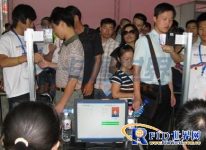
Application case of X-RFID chip in the Auto Expo on the west coast of the Taiwan Strait
[ad_1]
RFID radio frequency identification technology has great application potential in ticket anti-counterfeiting. Electronic tickets include barcode tickets, IC card tickets, magnetic card tickets, etc. RFID tickets are a kind of IC card tickets. It has the characteristics of strong anti-counterfeiting and strong use flexibility, but the cost is relatively high. The tickets using the X-RFID chip independently developed by Kellogg can not only greatly reduce the cost of using tickets, but also have outstanding anti-counterfeiting advantages. It is mainly reflected in two aspects: one is that ticket buyers can identify the authenticity through simple methods when buying tickets; the other is that ticket inspectors can easily and quickly identify the authenticity when the audience enters the venue. The true meaning of the ticket anti-counterfeiting system is to use the ticket anti-counterfeiting technology to grasp the two key links of ticket anti-counterfeiting, and combine computer technology and communication technology to realize the anti-counterfeiting management of tickets. Compared with the current anti-counterfeiting technology of traditional domestic tickets, such as ordinary color printing, anti-counterfeiting printing, bar code, anti-counterfeiting label, etc., RFID technology has obvious advantages in all aspects.

The X-RFID chip is applied to the Xiamen West Coast Auto Expo, which provides a solid and powerful technical guarantee for creating a high-standard, high-grade, and large-scale automobile feast in the West Coast Economic Zone of the Taiwan Strait.
On June 19, 2009 to June 22, 2009, the electronic ticket used the X-RFID chip with independent intellectual property rights of Jiangsu Kailuwei (X-RFID tag is packaged by Xiamen Xinda Huicong). The Haixi Auto Expo is hosted by the China Machinery Industry Federation. It is another national-level auto show following the Beijing Auto Show, Shanghai Auto Show and Guangzhou Auto Show.
X-RFID has the characteristics of anti-tampering, anti-detection and high security, especially suitable for electronic ticket applications. Haixi Auto Expo effectively avoids fake tickets by applying X-RFID electronic tickets, and at the same time, combined with the information system, it realizes the flow of people statistics and the accurate verification of ticket machines. The electronic ticket system using X-RFID technology has the characteristics of fast reading and barrier-free reading, simple implementation, convenient use, flexible system, and difficult to counterfeit. Each of the electronic tickets has a globally unique serial number, and the ticket information stored in the X-RFID chip is anti-tampering and anti-detection, so as to achieve safe, efficient and flexible anti-counterfeiting applications. In the actual application process, X-RFID technology can not only verify the authenticity of tickets, but also provide convenient services for the audience to pass quickly without causing congestion, and can completely prevent huge losses caused by fake tickets.
The application of X-RFID technology not only effectively manages and controls the identification of personnel identity information and ticket anti-counterfeiting at the Auto Expo, but also provides a solid foundation for the West Coast Auto Expo to create a high-standard, high-grade, and large-scale automobile feast in the West Coast Economic Zone. Strong foundation and guarantee.
In the era of rapid development of information, the electronic management of tickets is an important means to strengthen the management of exhibition passenger flow and improve management efficiency. Traditional tickets are easy to forge, easy to copy, release due to human feelings, and change people to enter the park, resulting in a serious loss of ticket revenue, and it is difficult to form computer statistics and management of visiting and entering the park. The electronization of ticket management will greatly improve the overall management level of legalization, standardization and informatization of the exhibition industry, and promote the upgrading of the industrial structure.
[ad_2]



